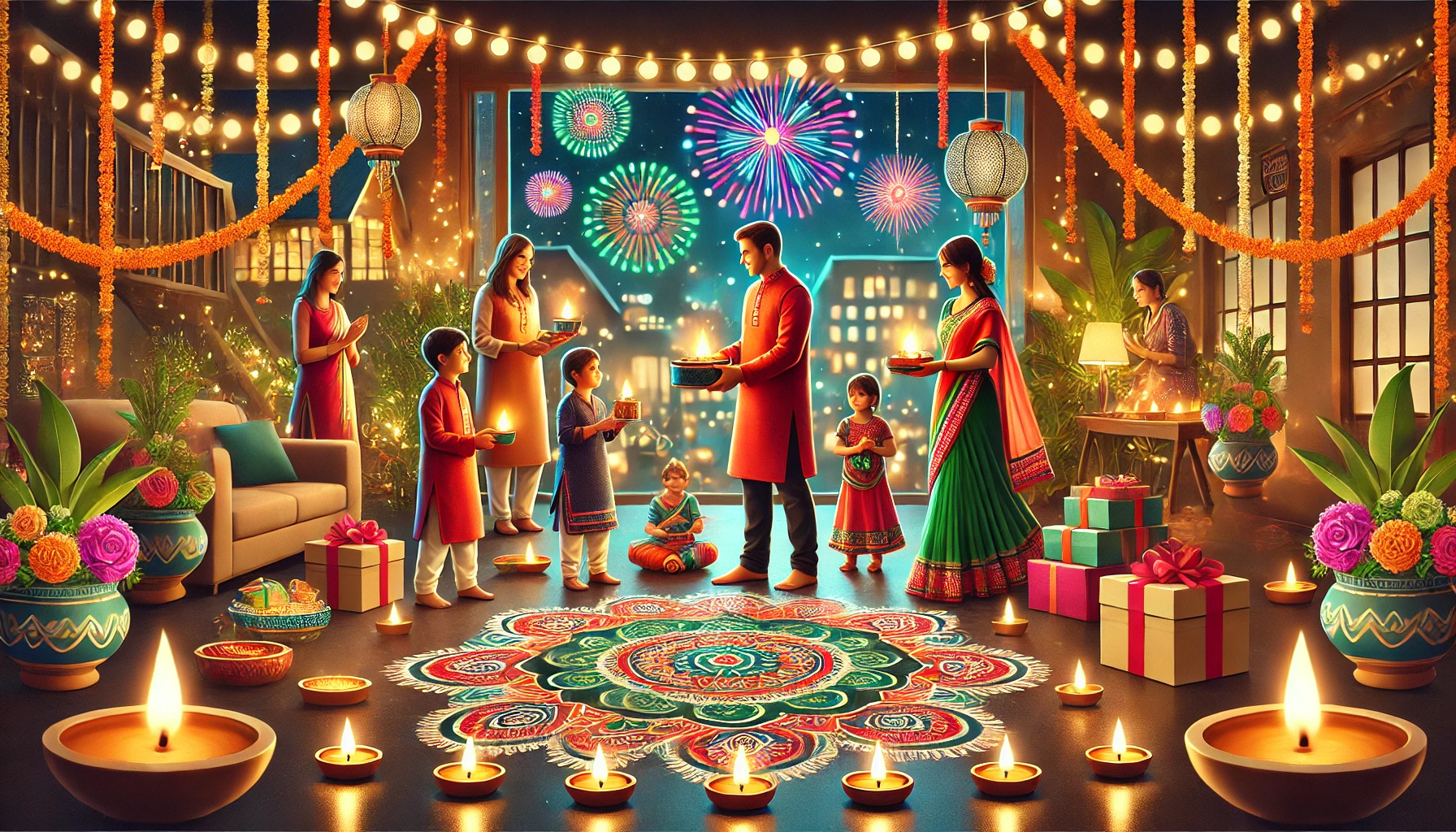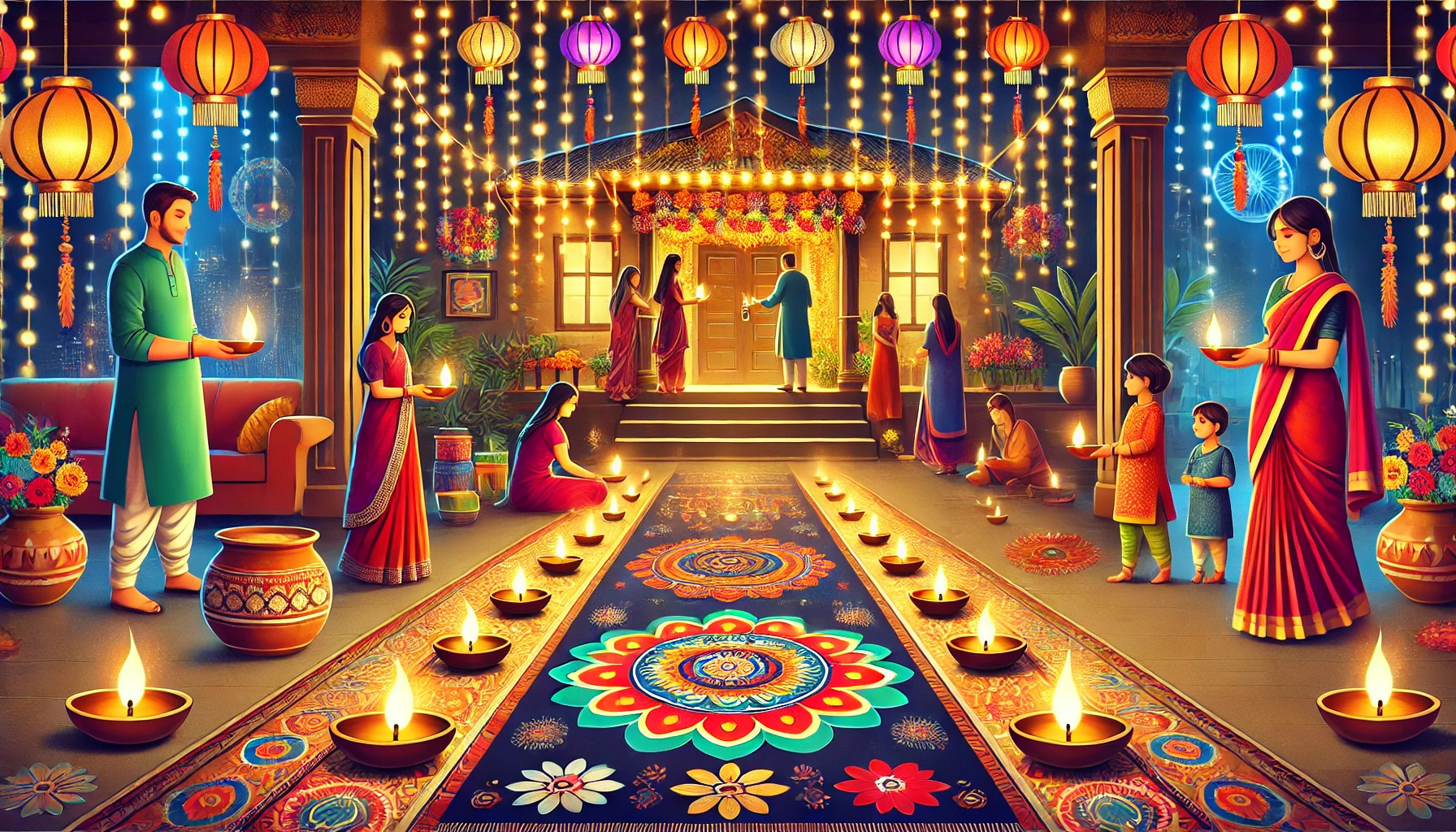Table of Contents
Diwali, also known as Deepavali, is one of the most celebrated festivals in India and among Indian communities worldwide. Known as the “Festival of Lights,” Diwali represents joy, prosperity, and the triumph of good over evil. Families and friends come together to decorate homes, light diyas (lamps), and share sweets, embodying the spirit of unity and warmth. In 2024, Diwali holds even more significance as people embrace traditions, find new ways to celebrate sustainably, and spread the message of light and positivity.

What is Diwali? Understanding the Origins and Meaning
The Story Behind Diwali
Diwali has deep mythological roots, and several Hindu epics and tales explain its origins. One popular story celebrates the return of Lord Rama to his kingdom Ayodhya after 14 years of exile, during which he defeated the demon king Ravana. The people of Ayodhya lit diyas to welcome him, symbolizing the triumph of light over darkness. Other stories include the worship of Goddess Lakshmi, the goddess of wealth, who is believed to visit homes and bless families with prosperity and good fortune during Diwali.
The Five Days of Diwali
Diwali is a five-day festival, with each day holding unique customs and significance:
- Dhanteras – The first day focuses on wealth and prosperity. People purchase gold, silver, or kitchen items, as it’s believed to bring good fortune.
- Naraka Chaturdashi (Choti Diwali) – This day symbolizes the victory over evil, celebrated with rangoli and lighting diyas.
- Lakshmi Puja – The main Diwali day when families perform Lakshmi puja, seeking blessings of wealth and well-being.
- Govardhan Puja – A day dedicated to Lord Krishna and the relationship between humans and nature.
- Bhai Dooj – The final day, celebrating the bond between brothers and sisters, marked by siblings exchanging gifts and blessings.
Diwali’s Cultural and Spiritual Importance
Beyond its mythological background, Diwali is a celebration of love, joy, and cultural heritage. It’s a time to come together, rekindle relationships, and reflect on spiritual beliefs. Diwali traditions encourage people to eliminate negativity and welcome new beginnings with an open heart, making it a festival of both material and spiritual renewal.
How Diwali is Celebrated – Traditions and Festivities
The Magic of Diwali Decorations
One of the most loved aspects of Diwali is decorating homes with lights, diyas, and rangoli (intricate patterns made with colored powders, rice, or flower petals). The diyas symbolize hope, prosperity, and protection against evil forces, while rangoli adds vibrancy to entrances, welcoming positivity into homes.
Diwali Puja and Rituals
Lakshmi Puja, performed on the main day of Diwali, is a central ritual. Families clean and decorate their homes to invite Goddess Lakshmi, praying for prosperity and peace. Offerings include sweets, fruits, and flowers, followed by an aarti (prayer) to honor Lakshmi and Lord Ganesha, who is believed to remove obstacles and bring blessings.
Sharing Sweets and Gifts
Diwali is synonymous with exchanging sweets and gifts as a way of spreading joy and strengthening bonds. Traditional sweets like laddoos, barfis, and gulab jamun are shared among family, friends, and neighbors. Gift exchanges are also popular, often including items like home decor, clothes, and dry fruits, symbolizing goodwill and prosperity.
Diwali 2024 – Trends and Modern Celebrations
Eco-Friendly Diwali
With increasing awareness about sustainability, many people are adopting eco-friendly ways to celebrate Diwali in 2024. This includes using biodegradable diyas, natural colors for rangoli, and avoiding single-use plastics. Low-noise, eco-friendly fireworks are also trending, helping reduce pollution while keeping the festive spirit alive.
Virtual Diwali Celebrations
With the world becoming more connected digitally, many families use video calls and online platforms to celebrate Diwali together across distances. Virtual pujas, digital greeting cards, and even online shopping for gifts have become popular, allowing families to celebrate the joy of Diwali, even from afar.
Diwali Recipes and Food Ideas for 2024
Food is at the heart of Diwali celebrations, and every region has unique dishes that make the festival special. Popular snacks include samosas, chakli, and chivda, while sweets like kaju katli, jalebi, and moong dal halwa add sweetness to the festivities. For those looking to try something new, fusion recipes like chocolate barfi or mango laddoo are modern twists that retain the essence of traditional flavors.
Diwali Wishes and Greetings for 2024
Heartfelt Diwali Wishes for Friends and Family
Share the love this Diwali with warm wishes that convey the festival’s spirit. Some messages to share include:
- “Wishing you a Diwali filled with peace, joy, and prosperity. Happy Diwali!”
- “May the light of Diwali bring happiness and success to you and your loved ones.”
- “Sending you warm Diwali wishes! May your life be as colorful, shimmering, and magical as the lights of Diwali.”
Diwali Greetings for Colleagues and Clients
For professional greetings, consider wishes that are respectful yet heartfelt, such as:
- “Wishing you and your family a joyous Diwali and prosperous year ahead.”
- “May this Diwali bring new opportunities and success to our collaboration. Happy Diwali to you and your team!”
- “Best wishes for a sparkling Diwali and a bright future.”
Creative Diwali Social Media Captions
For those looking to share the joy of Diwali on social media, here are a few ideas for captions and hashtags:
- “May your Diwali be as bright as the diyas and as colorful as the rangoli. #HappyDiwali #FestivalOfLights”
- “Bringing light, love, and positivity into our lives this Diwali! #Diwali2024 #CelebrateTogether”
- “Wishing everyone peace, prosperity, and joy on this beautiful Diwali night. #ShubhDeepavali”
Frequently Asked Questions (FAQs) about Diwali
- Why is Diwali called the Festival of Lights?
Diwali is known as the Festival of Lights because it symbolizes the triumph of light over darkness. People celebrate by lighting diyas and decorating homes with vibrant lights to signify joy, hope, and positive energy. - What are some traditional Diwali sweets?
Traditional Diwali sweets include laddoos, barfi, kaju katli, gulab jamun, and rasgulla, all of which add sweetness to the festivities and are shared as a gesture of goodwill. - How can I celebrate Diwali sustainably?
Eco-friendly Diwali ideas include using clay diyas, opting for biodegradable decor, and choosing natural colors for rangoli. Reducing the use of firecrackers also helps minimize pollution. - What’s the best way to wish someone a Happy Diwali?
The best way is to personalize your Diwali wishes, focusing on the themes of peace, prosperity, and joy. Short, heartfelt messages like “Wishing you light and joy this Diwali” work well for friends, family, and colleagues alike. - How is Diwali celebrated in different parts of India?
Diwali celebrations vary by region. North India emphasizes the return of Lord Rama, while in Maharashtra, it’s linked to the victory over demon Narakasura. In South India, it’s celebrated as Deepavali, marking the victory of Lord Krishna over Narakasura.
Diwali, the Festival of Lights, is more than just a celebration—it’s a time to connect, reflect, and spread positivity. Whether you’re lighting diyas, sharing sweets, or sending digital greetings, Diwali offers countless ways to bring joy and warmth into the lives of those around you. This Diwali, embrace the spirit of the festival by sharing love, celebrating responsibly, and bringing light to the lives of your loved ones. Happy Diwali!
More blogs: https://sleepingsirens.com

